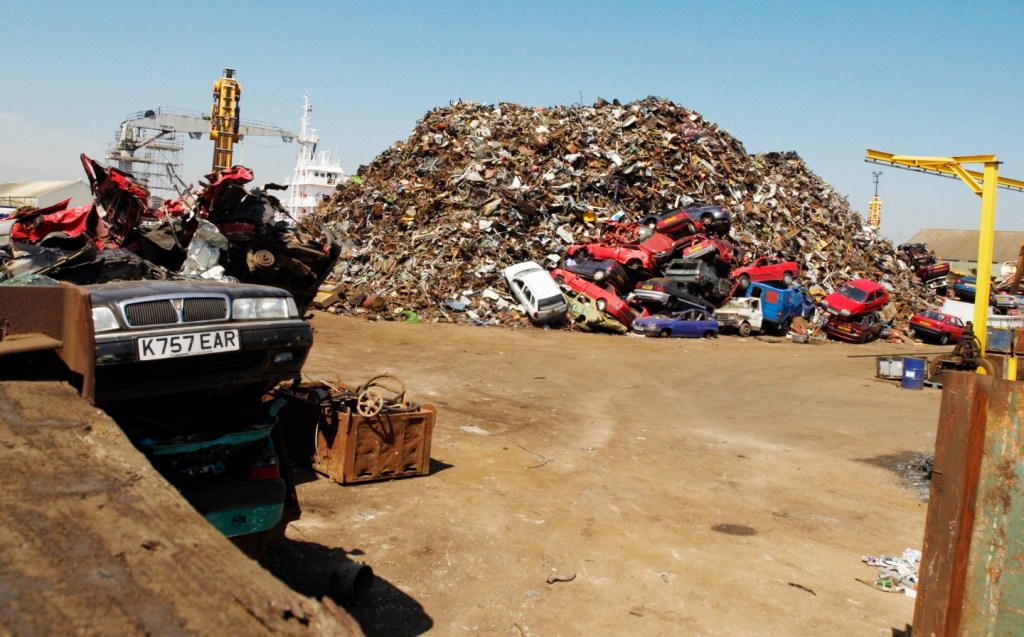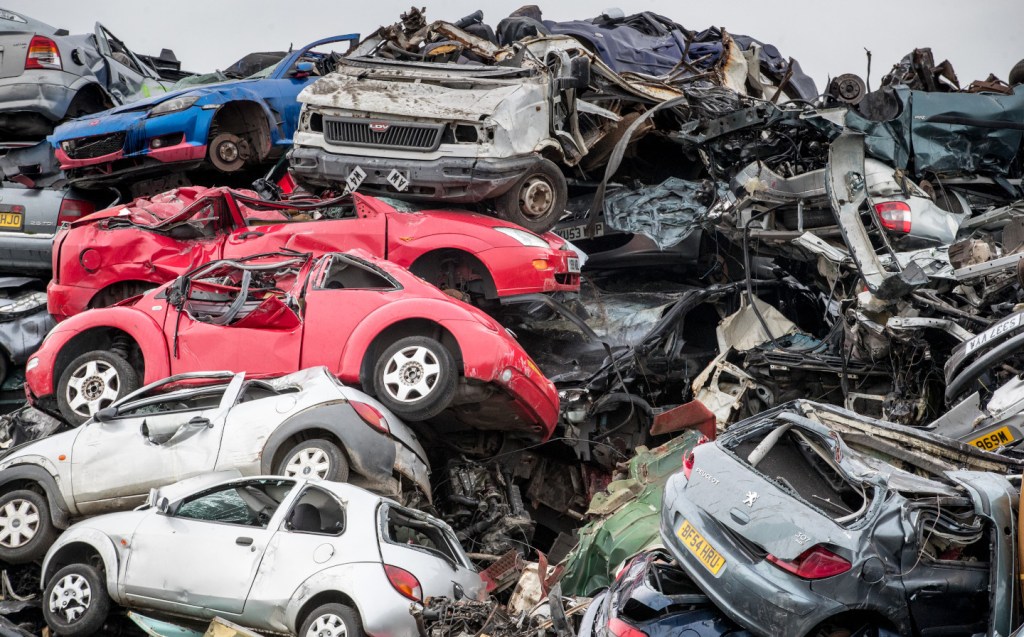Carmakers fined £461m in UK and Europe for not competing over vehicle recycling
Industry trade bodies involved in agreement not to advertise the data
Eleven major car brands, along with the bodies that represent motor traders in the UK and Europe, have been told to pay a total of £461 million after it was discovered they had formed a cartel to avoid competing over how much of their vehicles can be recycled.
The firms admitted wrongdoing after agreeing not to advertise the data, with the UK’s Competition and Markets Authority (CMA) saying those involved had also illegally colluded to avoid paying third parties to recycle customers’ scrap cars.
The manufacturers and trade bodies were handed penalties of almost £383m by the European Commission, with the CMA imposing fines amounting to nearly £78m.
According to the CMA, the companies — BMW, Ford, Jaguar Land Rover, Peugeot Citroen, Mitsubishi, Nissan, Renault, Toyota, Vauxhall and Volkswagen — were legally obliged to tell consumers about how their vehicles could be recycled, so buyers can take this into account when considering a new purchase.
Mercedes-Benz was also involved but escaped penalties in the UK due to the fact that it alerted the CMA to its participation.

The companies agreed not to advertise if their vehicles went above the minimum recyclability requirement of 85 per cent, according to reports. With the notable exception of Renault, the manufacturers agreed not to tell customers about the percentage of recycled material used in their vehicles.
Most of the manufacturers took part in the practice from May 2002 to September 2017, but Jaguar Land Rover did not join until September 2008. The agreement was enshrined in a “gentleman’s agreement” that sought to “avoid a competitive race” among manufacturers.
The CMA says the agreement was referenced in emails, internal documents and meeting minutes, and some manufacturers challenged others when they breached the deal.

Between April 2004 and May 2018, eight manufacturers — BMW, Ford, Mercedes-Benz, Peugeot Citroen, Renault, Toyota, Vauxhall and Volkswagen — were involved in a “buyers’ cartel” over their scrapping of old vehicles that have reached the end of their useful life.
By law, manufacturers must offer owners of such vehicles (known as end-of-life vehicles or ELVs) a free-of-charge recycling service, although the service is regularly outsourced to third parties. The eight manufacturers admitted agreeing not to pay third-party companies to handle the recycling of customers’ ELVs. Although such companies can often make money from ELVs by selling used parts and raw materials, the agreement meant they could not negotiate prices with the manufacturers.
The European Automobile Manufacturers’ Association (ACEA), the Society of Motor Manufacturers & Traders (SMMT), Nissan and Mitsubishi joined the agreement in 2006, with Jaguar Land Rover following in 2016.

The CMA confirmed the SMMT and ACEA had been involved in both agreements, having facilitated the arrangements and chaired meetings, as well as intervening when manufacturers acted outside the terms.
All the manufacturers and bodies asked to pay penalties in the UK have now settled with the CMA, admitting their illegal behaviour and agreeing to pay fines totalling £77,688,917.
Mitsubishi and Stellantis, the company that owns Peugeot, Citroen and Vauxhall, approached the CMA for leniency and have received a reduction in their fines. The lion’s share of the fines was borne by Ford, which paid out more than £18.5 million.
“Agreeing with competitors the prices you’ll pay for a service or colluding to restrict competition is illegal and this can extend to how you advertise your products,” said Lucilia Falsarella Pereira, senior director of competition enforcement at the CMA.
“This kind of collusion can limit consumers’ ability to make informed choices and lower the incentive for companies to invest in new initiatives.
“Today’s fines show our commitment to taking action when competition law is broken. In accordance with our leniency policy, we’ve given discounts to those who came forward with information and co-operated at an early stage, which helps to get the swiftest outcomes. We recognise that competing businesses may want to work together to help the environment – in those cases our door is open to help them do so.”
Industry responses
Driving.co.uk contacted all the involved companies with a UK presence for comment, with the following responses received at the time of publication.
The SMMT, which represents UK car makers and dealers, has admitted wrongdoing, and accepted the CMA’s findings. In a statement, the organisation said: “The SMMT cooperated fully with the CMA’s investigation and accepts its findings. [The] SMMT takes its competition law obligations extremely seriously and has thoroughly reviewed and bolstered its protocols to safeguard current and future compliance.”
Stellantis said: “Stellantis acknowledges the decisions announced today by the European Commission and the UK Competition and Markets Authority on anti-competitive conduct in connection with the recycling of end-of-life vehicles. The company has fully cooperated with both entities throughout these investigations, and this collaboration has led to settlements with reduced fines, totalling €99.5m (£83m) and £10.4m, respectively. The fine has already been provisioned for and reflected in the company’s full year 2024 results.”
The BMW Group also accepted the punishment, saying: “The antitrust authorities in both the EU and the UK have conducted investigations against numerous manufacturers, including the BMW Group, in connection with the recycling of end-of-life vehicles. The BMW Group has agreed to a settlement proposed by each of the authorities to end the proceedings and has accepted the fine.”
A Volkswagen Group spokesperson commented: “Volkswagen Group UK (VWG) notes today’s decision of the UK Competition and Markets Authority. VWG has cooperated fully with the CMA throughout its investigation and remains committed to ensuring full regulatory compliance”.
A representative of Renault had the following to say: “The infringing practices date back to 2002 and ended in 2018, at a time when the structuring of the ELV (end of life vehicle) recycling sector was still nascent, as was environmental communication.
“The practices do not financially harm consumers. What is being penalised is the principle of having agreed among carmakers on how to manage the issue of ELV collection and treatment, and certain aspects of advertising vehicle characteristics.
“Regarding the environmental characteristics of new vehicles (recyclability and recycling), this has been governed by regulations that Renault Group has always respected.
“With respect to the use of recyclates, Renault specifically distanced itself from the collusion and was the first carmaker to promote these characteristics.”
A spokesperson for JLR said: “JLR cooperated with both authorities during their investigations. We are committed to complying with competition law and have taken steps to further strengthen compliance.”
Related articles
- If you were interested in the car manufacturers’ large settlement for breaking competition law, you might want to read that the average UK car insurance premium is now over £1,000 a year
- Can you claim insurance if a tree lands on your car in a storm?
- And have you seen our guide on how to scrap your car?
Latest articles
- F1 2025 calendar and race reports: The new Formula One season as it happens
- Seven great automotive events to visit this summer, from F1 to art and champagne
- Watch new Porsche 911 GT3 smash Nürburgring record for manual cars
- Skoda Elroq 2025 review: Czech carmaker can’t seem to miss with its electric family cars
- Five best electric cars to buy in 2025
- Should I buy a diesel car in 2025?
- Zeekr 7X AWD 2025 review: A fast, spacious and high tech premium SUV — but someone call the chassis chief
- Denza Z9GT 2025 review: Flawed but sleek 1,062bhp shooting brake from BYD’s luxury arm
- Extended test: 2024 Renault Scenic E-Tech review














